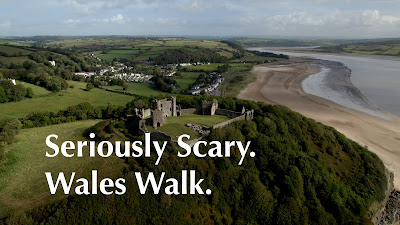When 'making a fuss' saves lives - Matt's life-affirming story
When something goes a little bit wrong at the coast, many people don’t want to make a fuss. Matt Halliday was one of them. But it took a single innocent walk at his local coastline to change his mind for good. One small event escalated into a life-threatening situation, leaving him unconscious and his family frantic with worry.
He’s shared his story with us as he wants people
to raise the alarm without delay if they are in difficulties and not to worry
about making a fuss. We agree. It’s better to be safe than sorry.
 |
| Matt Halliday revisited the site of his ordeal in better weather, accompanied by Cliff his dog |
Earlier this year, keen walker Matt stepped out
for a good walk around his local coastline near Kirkcolm on the South West
coast of Scotland, an area he’s walked for 35 years. He was well prepared as
usual, equipped with a fully charged mobile phone and wearing sturdy footwear
and suitable clothing for almost all types of weather.
From a setback to a survival story
But even with all the precautions, it wasn’t
quite enough to prevent a small setback from turning into a survival story he
knows he’s lucky to tell.
Having been out for several hours around the
rugged coastline, he was already tired when a heavy storm came in, along with
the tide. At that point, he took the wrong decision.
 |
| The rocks where Matt sheltered from the storm can be seen in the background |
“I’d failed to pay attention to the tide so I was cut off and getting soaked and cold. I didn’t want to cause a fuss so I thought I’d shelter by some caves and wait it out. I thought I can handle this, but that was the wrong thing to do because avoiding making a small fuss turned it into a huge big fuss,” Matt reflected.
Shivering against the February storm, he settled
up against the rocks. And remembers nothing more until a mud slide he describes
as ‘the size of a large builders’ bag’ hit his head.
My head felt like it was going to pop
“I must have been unconscious but when the mud
slip hit, the weight of it felt like my head was going to pop. By now it was
dark. I knew I needed help.
“I could barely move but managed to crawl out across the rocks and eventually got a weak phone signal. I called 999 and asked for the Coastguard and got cut off, but they phoned me back. I was just about able to tell them where I was and the relief when I saw the blue lights a short time later was incredible so I shone my phone torch so they could see me,” Matt said.
 |
| The slippery rocks that Matt and the rescuers had to navigate in the cold and dark to get him to safety |
The teams reached Matt by wading through a flooded access path and they provided immediate casualty care which is essential for a hypothermic casualty before transferring him to the next level of care from the helicopter crew. He was airlifted by the helicopter to a safe place where he could be met by the ambulance and taken to hospital to be checked over.
“I was told later that I had less than an hour to
live had the rescuers not come to my aid. I am just so grateful and I’m
exceptionally lucky to live to tell the tale. I never want to put myself or my
family through that again. It’s a lesson learned and in future, I’d definitely
make that 999 call earlier,” said Matt.
 |
| Matt took shelter at this rocky inlet during a storm, he was hypothermic and a mud slip brought him back to consciousness |
Senior Coastal Operations Officer Richard Morgans said:
“It doesn’t matter how well you know an area and
even the best prepared of people can still get caught out on our coasts. Luck
was just not on Matt’s side that day and it was a combination of small events
that led to the perfect storm that caught him out. We’d say that if anyone’s in
trouble around our coasts at any time of the day or night, just give us a call
on 999. Even if you don’t think it’s life-critical, a situation can
escalate in seconds and that call could just save a life.”
Safety tips
If you’re planning a coastal walk at any time of
the year, here’s our safety tips:
- Check weather and tides
- Tell someone where you’re going and
when you’ll be back
- Take a fully charged mobile phone in a waterproof pouch
- In remote locations where mobile
signals may be patchy, consider taking additional back up such as a
personal locator beacon
- Keep a check on where you are
including noting visible landmarks
- Wear sturdy footwear and clothing
If you get into trouble or see anyone in difficulties, call 999 and ask for the Coastguard.


